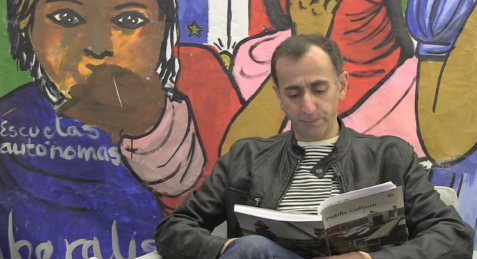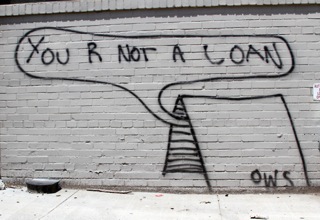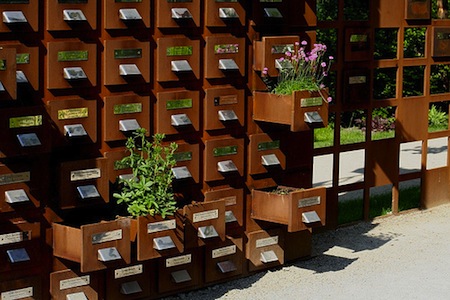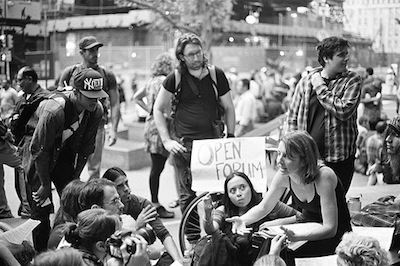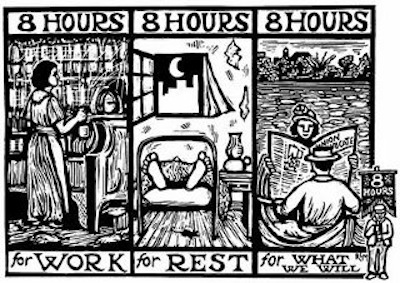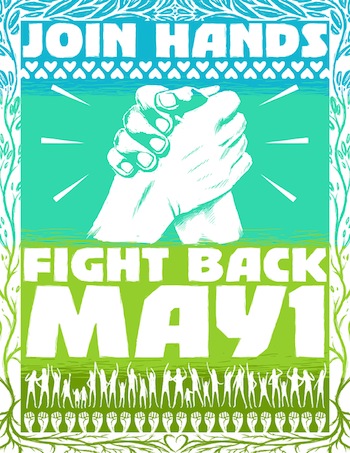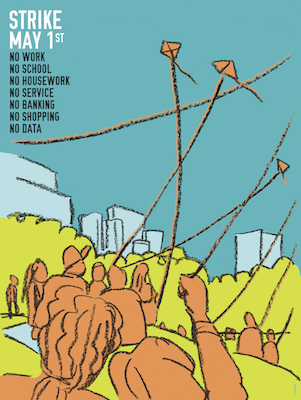Social Text Collective Member Nicholas Mirzoeff reads his September 2012 Public Culture essay “Why I Occupy.”
Category: Dispatches from an Occupation
Social Text Periscope on OWS
Ashley DawsonClick here to read. On the one year anniversary of Occupy Wall Street, Social Text is pleased to debut “Is This What Democracy Looks Like?” a collection of original essays on horizontalism in theory and practice. Written and edited by faculty and graduate … Continue reading “Social Text Periscope on OWS”
The Generosity of the Archivist
Evan NeelyA friend of Occupy recently passed away: Michael Nash, head of the Tamiment Library and Robert F. Wagner Labor Archives at NYU. I had only a passing personal acquaintance with Michael, but this is not untypical of the ways we … Continue reading “The Generosity of the Archivist”
Notes from Europe: Rosa Nera
Ernest LarsenDetail of massive ferry, while still in Piraeus port All but two of the dozens of flat-screen TVs on the many upper decks of the giant ferry E. Venizelos (now en route from Piraeus to Chania) were tuned to the … Continue reading “Notes from Europe: Rosa Nera”
I am not an activist. This is not a protest.
Evan NeelyOne of the members of my working group, The People’s Think Tank, recommended me as a good person to speak to young activists last week at the Civil Rights Student Summit in New York organized by Teaching Matters. The folder they gave to the set of people they brought in to speak to the students, most of whom were in eighth grade, said “community activist” on the front. Reading that brought me back to a discussion facilitated by the Think Tank on May Day, where we got to talking about what it meant for us to be activists. When it was my turn to speak, the only words on offer were something like “I really don’t like to think of myself as an activist. I kind of want to think of myself as a normal person.
May Day Reborn!
Ashley DawsonThe Occupy Movement has revived May Day. For far too many years, this holiday, which was of course also a solidarity-building occasion, has been ignored by the US labor movement.
Striking New Relationships
Nicholas MirzoeffRe-posted from Occupy 2012. Why do we strike on May Day? What is that strike? We strike in solidarity with global labor, our own histories and with each other. The action of striking is not just a withdrawal of labor but … Continue reading “Striking New Relationships”
Back to the Big Apple
Ashley DawsonItaly was really great, but it’s so good to be back in NYC! Today I walked through Union Square, which is filled with tables distributing information for Occupy May Day. There’s a very exciting series of events planned, as well … Continue reading “Back to the Big Apple”
Striking New Relationships
Nicholas MirzoeffWhy do we strike on May Day? What is that strike? We strike in solidarity with global labor, our own histories and with each other. The action of striking is not just a withdrawal of labor but what Marina Sitrin calls “striking new relationships.” The actions of refusal to play the part expected of us, in whatever way we can, and imagining other ways of relating to each other are what will constitute a day of generally striking, a striking day.
Take Artists Space: Dissensus and the Creation of Agonistic Space
Andrea Liu“What does it mean to be uninvited?” This is the question Benjamin Buchloh posed in response to the work of Christopher D’Arcangelo exhibited at Artists Space in October 2011. D’Arcangelo created unauthorized anarchist interventions into the gallery and erased … Continue reading “Take Artists Space: Dissensus and the Creation of Agonistic Space”
On Fear, Theory, and Acting Anyways
Hannah Chadeayne AppelIt has been through my participation in Occupy that I’ve first come to feel my citizenship, not in the narrow national sense, but in a broader sense of intentional political subjectivity in the world. Through my adult life I’ve voted, … Continue reading “On Fear, Theory, and Acting Anyways”
Revolutionary Expertise?
Hannah Chadeayne AppelAs the New York Occupy movement goes on, it also spreads out. 16 Beaver, Charlotte’s place, and the Atrium of 60 Wall Street (now home to General Assemblies), remain nodes in the occupied downtown real estate network, but the overwhelming … Continue reading “Revolutionary Expertise?”
People Before Process: the Bureaucracies of Anarchy Pt. 2
Hannah Chadeayne AppelSometime in early October I showed up to an OWS organizer’s meeting at 16 Beaver Street. 16 Beaver, like 56 Walker or Charlotte’s Place, is one of these magically anachronistic spaces in lower Manhattan that feel like something out of Patti Smith’s Just Kids — free space for art, activism, and organizing, embedded in some of the most expensive real estate in the world. Of course, to label these spaces “anachronistic” is to cede to capital its totalizing power.
We interrupt this dispatch … Occupy Oakland and the General Strike!
Hannah Chadeayne AppelI didn’t realize how claustrophobic Wall Street’s Liberty Park was until I arrived at my home Occupy in Oakland. Rather than the jumble of tarp-covered shelters that grew and morphed rhizome-like through Liberty Park, Occupy Oakland’s colorful tents felt positively … Continue reading “We interrupt this dispatch … Occupy Oakland and the General Strike!”
The Ritual of General Assembly and the Bureaucracies of Anarchy
Hannah Chadeayne AppelIf you have spent anytime with Occupiers, you have seen people (sometimes by the thousands) hold their hands above their heads and wiggle their fingers. Jazz hands? Cult sign? Known as “twinkling” when it expresses a positive sentiment, the hand … Continue reading “The Ritual of General Assembly and the Bureaucracies of Anarchy”


